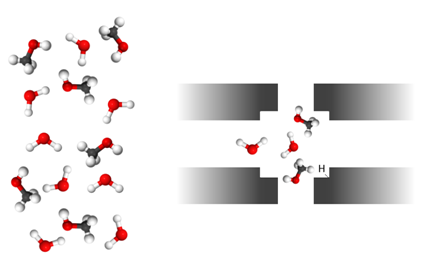Translation of experimental conditions into model systems for methanol to olefins conversion in zeolitic materials
Translation of experimental conditions into model systems for methanol to olefins conversion in zeolitic materials
Promotor(en): V. Van Speybroeck /15_NANO12 / Nanoporous materialsIn chemical industry, zeolites are frequently applied for chemical conversions. In such zeolite-catalyzed conversions, reactants first adsorb in the nanoporous host material before any chemical conversion occurs. Often, the feed of these processes consists of a mixture of two or more components. Furthermore, depending on the process conditions (pressure, temperature, etc.) a large number of guest molecules might be present around the active site where reactions occur. Taking into account all of the above-mentioned factors in models is very complex and became available thanks to many recent model developments.
An important industrial zeolite-catalyzed process, is the conversion of methanol to olefins (MTO). The MTO chemistry is very complex as it was found that next to the zeolite, also organic reaction intermediates catalyze the reactions. A typical feed for this process consists of methanol-water mixtures. Most theoretical models of elementary reaction steps during the MTO process typically focus on one single methanol molecule as reactant. However, recent studies pointed out that this might be an oversimplification. When linking theoretical results with experimental data, it remains unclear how real-life process conditions should be translated into model systems. This question is the topic of the current proposal.

Figure 1: The methanol to olefins feed typically consists of methanol-water mixtures.Goal This thesis consists of two parts. First, the composition of methanol-water mixtures inside the zeolitic material will be assessed, given a range of feed compositions, temperatures and pressures applied during MTO experiments. Hereby, a recently developed thermodynamic model will be applied that is able to predict the loading of a nanoporous material, given the conditions of the feed. Currently, the model is able the predict the loading of a single component. To extent the model to multicomponent adsorption, additional research is needed to account for the interaction between the different species. Second, the influence of the presence of water in the MTO process on the observed organic reaction intermediates. The obtained results will be combined with a set of experimental data. The research will be performed in the framework of a larger concerted action to simulate chemical transformations at operating conditions. The Center for Molecular Modeling has built up vast expertise in these advanced simulation techniques and collaborates on the subject with leading experimental and theoretical partners. It is the intention to involve the student actively in the work discussions with our collaborators. The CMM has access to sufficient computational resources to execute this research project. The proposed topic is challenging and requires technical skills, creativity and chemical insight.
The Center for Molecular Modeling has ample experience with modeling of adsorption and reactions in nanoporous materials and has enough available computational resources to enable the challenging simulations for this research topic.
- Study programmeMaster of Science in Chemical Engineering [EMCHEM]KeywordsZeolites, Computational applications, Adsorption, Thermodynamics

